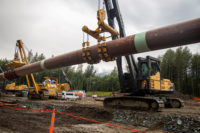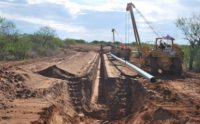Opponents of a $100-million natural gas compressor station on Boston’s South Shore are pushing the Federal Energy Regulatory Commission for a chance to make their case to shut down the controversial and barely completed plant after the agency reversed its position in a key vote.
FERC recently ruled that it had previously erred when it rejected a request by neighbors and environmental activists and opted not to hold a public hearing on Canadian pipeline giant Enbridge’s Weymouth Compressor Station.
The newly constructed compressor station is a crucial piece of Enbridge’s $600 million U.S.- to-Canada Atlantic Bridge pipeline upgrade project, but its placement in the industrial and lower-income Fore River Basin in Weymouth has sparked opposition from both residents and environmentalists concerned about the climate change implications.
The station finally went into service late in January after being taken offline in October following a pair of emergency shutdowns during the commissioning process of the new facility. After years of delays, construction on the compressor plant was completed over the summer.
The plant is the lynchpin in Enbridge’s Atlantic Bridge project, designed to boost capacity of the pipeline giant’s existing network, replacing 187 miles of pipeline and adding compressor stations to boost the flow. The Weymouth Compressor Station plays an especially critical role, linking two different and already existing natural gas pipelines connecting Canada to the Northeast.
FERC officials need to respond to the opposition to the plant's location, which has sparked concerns about climate change and environmental justice implications, recently appointed FERC chairman Richard Glick recently argued.
“Weymouth Compressor Station raises serious environmental justice questions, which we need to examine,” Glick wrote in a tweet after the vote. “The communities surrounding the project are regularly subjected to high levels of pollution and residents are concerned emissions from the station will make things worse,” he posted.
Opponents of the Weymouth natural gas project now want federal regulators to schedule a hearing.
While pleased with the commission’s vote, opponents are concerned that with no hearing yet scheduled, their appeal is in a “grey zone” where official action is effectively frozen, said Alice Arena, president of Fore River Residents Against the Compressor Station.
“They have never granted this kind of rehearing request,” she said. “We are putting a lot of hope in Chairman Glick. He was one of the more vocal members on this. I was stunned.”
The Fore River group has launched an online campaign in hopes of getting FERC to take the next step, with members and other plant opponents posting more than 100 comments on the regulator’s website.
Max Bergeron, an Enbridge spokesperson, countered that the FERC meeting did not lead to any changes to the compressor station or its operating status.
“The Federal Energy Regulatory Commission’s January 19 meeting does not change the status of the project at FERC, and the in-service authorization previously received from FERC remains valid,” wrote Bergeron in an email, referring to the facility.
Meanwhile, a recently completed safety review of the newly minted compressor station revealed issues, at least one possibly tied to the damage caused to the facility during construction.
The review, conducted by a firm hired by Enbridge, looked at the causes of the two emergency shutdowns of the plant during the commission review process last September, which resulted in the release of hundreds of thousands of cubic meters of gas.
A failure in the compressor station’s electrical system—and in particular, “a temporary loss of direct current power to the Emergency Shutdown (ESD) panel”—was the cause of the second emergency shutdown on Sept. 30, according to Bergeron.
Two potential causes of the second shutdown were identified by the outside firm hired to review the incidents.
The first involves the possibility of an open circuit “caused by faulty equipment, loose connection, or damage during shipping,” according to the spokesperson.
The second possibility is the open circuit was the result of “vibration as a result of large-scale ground compaction activities conducted during construction,” Bergeron wrote.
The cause of the first emergency shutdown, on Sept. 11, was tied to the use of the wrong O-ring on a filter separator.
“After a thorough review process, we have addressed the issues which led to the unplanned events last fall and verified that the Weymouth Compressor Station facilities are ready for full service,” Bergeron said. “We are committed to being good neighbors and operating the compressor station safely and responsibly.”






Post a comment to this article
Report Abusive Comment